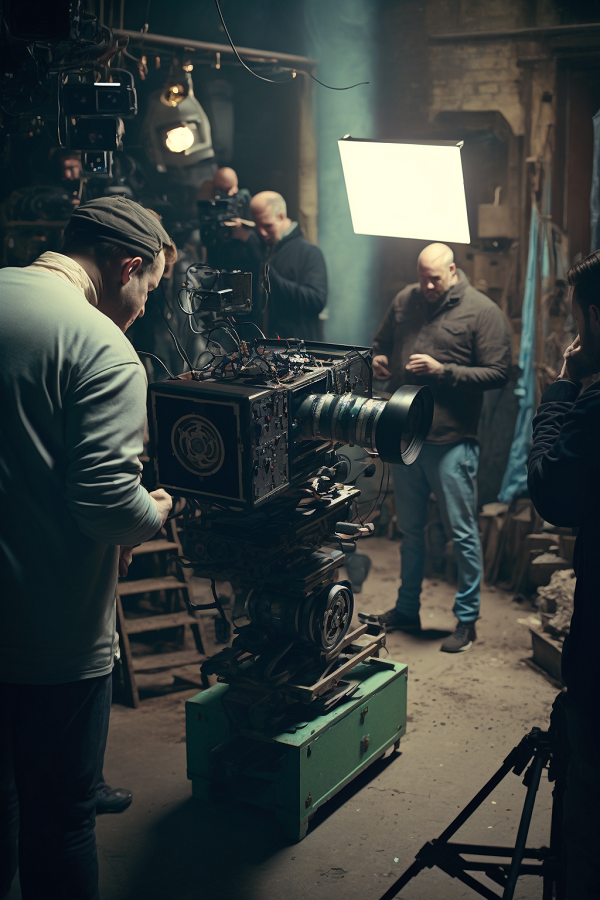Popularity Views : 398
Behind the Lens: The Ethics and Artistry of Film Adaptations of Memoirs and Autobiographies
Memoirs and autobiographies have always been a source of inspiration for filmmakers. The real-life stories of individuals can be captivating, emotional, and relatable. And when those stories are brought to the big screen, they can have a powerful impact on audiences around the world.
But adapting a memoir or autobiography into a film is no easy task. Filmmakers must balance the need to stay true to the source material while also making a compelling movie that will resonate with viewers. Some adaptations have been successful, while others have fallen flat. In this article, we will explore some of the most notable film adaptations of memoirs and autobiographies and examine what makes them successful.
The challenge of adapting memoirs and autobiographies
When a filmmaker decides to adapt a memoir or autobiography into a film, they face several challenges. The first challenge is to capture the essence of the story and the voice of the author. Memoirs and autobiographies are personal accounts of real-life experiences, and the author’s voice is an essential element of the story.
- “The autobiographical element in a work of art is always a betrayal. You are stealing someone else’s life.” – Julian Barnes
Filmmakers must also decide which parts of the story to include in the film and which to leave out. Memoirs and autobiographies often cover a long period of time, and it can be challenging to condense that into a two-hour movie. Filmmakers must make choices about what to focus on and what to cut.
Another challenge is to make the story cinematic. Memoirs and autobiographies are often introspective and reflective, which can be difficult to translate onto the big screen. Filmmakers must find a way to make the story visually interesting and engaging.
But when filmmakers are successful in adapting memoirs and autobiographies into films, the results can be incredible. Here are some of the most successful film adaptations of memoirs and autobiographies.
“The Pursuit of Happyness” (2006)
“The Pursuit of Happyness” is based on the memoir of the same name by Chris Gardner. The film stars Will Smith as Gardner, a struggling salesman who becomes homeless with his young son. The story follows Gardner’s journey as he tries to provide for his son and build a better life for himself.
One of the reasons “The Pursuit of Happyness” is so successful is that it stays true to the emotional core of Gardner’s story. The film captures the struggles and hardships Gardner faced while also showing the love and dedication he had for his son. Will Smith’s performance is also a standout, and he brings a depth and vulnerability to the role that makes the character feel real and relatable.
- “Adapting a book into a movie is like turning a steamboat into a battleship: some things are gained and some are lost.” – Larry McMurtry
“The Diary of a Teenage Girl” (2015)
“The Diary of a Teenage Girl” is based on the graphic novel of the same name by Phoebe Gloeckner. The film follows 15-year-old Minnie as she navigates her way through adolescence in 1970s San Francisco. The story is told from Minnie’s perspective, and the film explores themes of sexuality, identity, and coming of age.
One of the reasons “The Diary of a Teenage Girl” is so successful is that it captures the spirit and energy of the graphic novel. The film uses animation and visual effects to bring Minnie’s inner thoughts and fantasies to life, making the story feel vibrant and alive. The performances are also excellent, particularly Bel Powley as Minnie, who brings a raw and honest portrayal of teenage angst and insecurity.
- “In order for a film adaptation to be successful, it must capture the heart and soul of the story, as well as the voice of the author.” – Quentin Tarantino
“The Wolf of Wall Street” (2013)
“The Wolf of Wall Street” is based on the memoir of the same name by Jordan Belfort. The film stars Leonardo DiCaprio as Belfort, a stockbroker who rises to power and wealth in the 1990s but is eventually brought down by his own greed and corruption.
One of the reasons “The Wolf of Wall Street” is so successful is its unapologetic portrayal of Belfort’s excess and debauchery. The film is fast-paced, frenetic, and unrelenting, capturing the hedonistic lifestyle of the stockbroker and his colleagues. DiCaprio’s performance is also a standout, and he brings a manic energy to the role that makes the character both charismatic and repulsive.
“The Glass Castle” (2017)
“The Glass Castle” is based on the memoir of the same name by Jeannette Walls. The film stars Brie Larson as Walls, a successful journalist who reflects on her unconventional upbringing with her parents, who were nomadic and struggled with alcoholism and poverty.
One of the reasons “The Glass Castle” is so successful is that it captures the complex dynamics of Walls’ family. The film explores themes of love, loyalty, and forgiveness, while also depicting the dysfunction and abuse that Walls and her siblings experienced. Brie Larson’s performance is also excellent, and she brings a vulnerability and sensitivity to the role that makes the character feel authentic and relatable.
“Wild” (2014)
“Wild” is based on the memoir “Wild: From Lost to Found on the Pacific Crest Trail” by Cheryl Strayed. The film stars Reese Witherspoon as Strayed, a woman who sets out to hike the Pacific Crest Trail as a way of healing from the loss of her mother and the dissolution of her marriage.
One of the reasons “Wild” is so successful is its depiction of Strayed’s journey of self-discovery. The film captures the physical and emotional challenges she faces on the trail, while also exploring the memories and experiences that led her there. Witherspoon’s performance is also excellent, and she brings a depth and nuance to the role that makes the character feel both flawed and inspiring.
“12 Years a Slave” (2013)
“12 Years a Slave” is based on the memoir of the same name by Solomon Northup. The film stars Chiwetel Ejiofor as Northup, a free Black man who is kidnapped and sold into slavery in the 1840s.
One of the reasons “12 Years a Slave” is so successful is its unflinching portrayal of the brutality and inhumanity of slavery. The film does not shy away from the violence and abuse that Northup and other enslaved people experienced, making it a difficult but necessary watch. The performances are also excellent, particularly Ejiofor’s, who brings a quiet strength and resilience to the role.
- “A good adaptation is one that stays true to the spirit of the book, but also takes advantage of the unique qualities of film as a medium.” – John Green
Conclusion
Adapting memoirs and autobiographies into films is a challenging task, but when done successfully, it can result in powerful and moving movies. The best adaptations stay true to the essence of the story and the voice of the author, while also making the story cinematic and engaging. Whether it’s the unrelenting excess of “The Wolf of Wall Street” or the introspective journey of “Wild,” the films on this list capture the emotional core of their source material and provide a glimpse into the lives of real people.


















